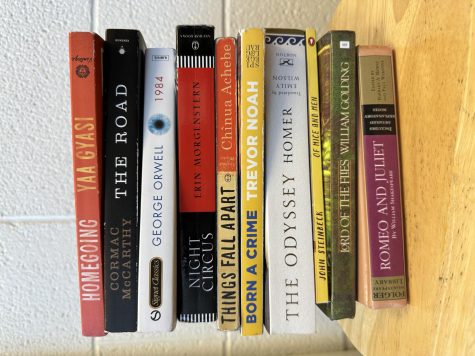New Virginia law prompts FCPS and other districts to create policies on ‘sexually explicit’ materials
March 28, 2023
Earlier this school year, Fairfax County Public Schools (FCPS) announced that, in accordance with a new Virginia law passed in April of 2022, the county would be screening instructional materials (primarily books read in English classes) for “sexually explicit” content.

The new Virginia law requires every Virginia public school district in the state to inform parents of the use of any “sexually explicit” instructional material, and also allows parents the option of opting their children out of any flagged content and the ability to request or determine alternative materials.
The state has requested that each individual district conduct reviews of material and create policies in agreement within the models set by the Governor’s Office. Even schools in FCPS, which have already operated under a system through which books are approved by teachers, administrators and parents, have been required to send the county a list of every book read in English classes. Following the review of these books, any that are considered school appropriate will be labeled as such in a letter sent to parents at least 30 days before the materials are used. In said letter, there will also be information regarding options for alternative texts.
“Essentially there is a little more paperwork in the process,” English Department Chair Katie Newman said. “You’re sending a letter instead of a syllabus.”
Madison students have largely been unsupportive of the law. Many argue that warning parents about sexual content in books could have negative consequences. They have noted that this law could inadvertently or purposefully target LGBTQ groups. Similar laws have been passed, such as Florida’s “Don’t Say Gay” bill, which many felt was an attack on LGBTQ groups. According to FCPS, however, the policy “shall not be construed to require or provide for (1) the censoring of books in public elementary and secondary schools, or (2) the designation of instructional material as sexually explicit based solely upon the sexual orientation of the characters contained therein.”
Nevertheless, the law’s focus on highlighting sexual content alone has prompted negative reactions from students.
“Youngkin’s take on this is absolutely bogus,” Vesper Padgett (’23) said. “You can’t shelter kids from sexuality, it’s natural and if they are hidden from it, they will develop an unhealthy relationship with it.”
This sentiment has also been echoed by other students, despite little change in actual FCPS policy. Others have highlighted that the law is being used as a smokescreen for political or social motives and that educational policy is simply the medium through which this is being pushed.
“Education should encapsulate all aspects of life- even the parts we tend to shy away from,” Nick Carlson (’23) said. “That is why I believe this law is not purposeful in its meaning, instead it is an effort to use education as some sort of political tool.”


